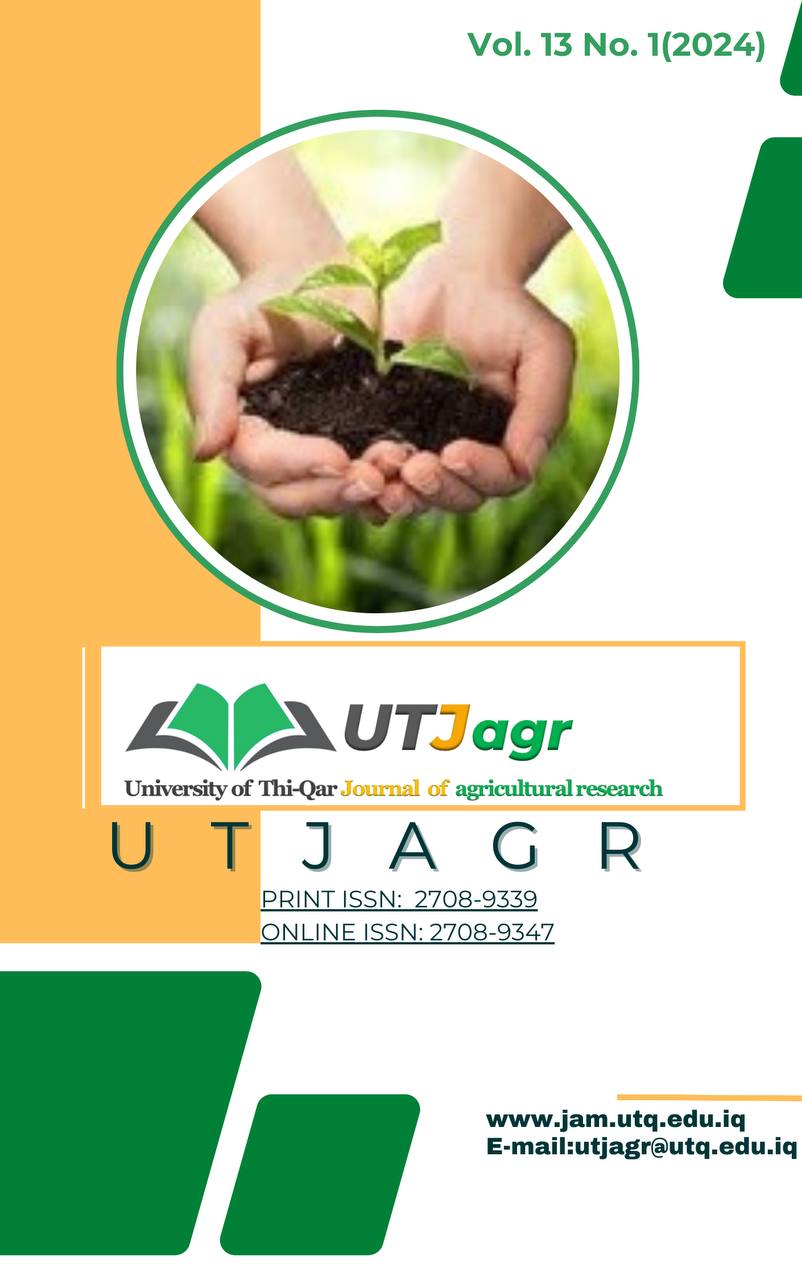In Vitro Differentiation of Myoblast Cells on Sheep Omentum Scaffold to Mature Myofibers
DOI:
https://doi.org/10.54174/jj828k38Keywords:
Myoblast, Myofiber, Scaffold, DecellularizationAbstract
The study aimed to engineer skeletal muscle tissue by used in vitro myoblast seeding on scaffolds to construct skeletal muscle tissue. Consequently, a scaffold made of sheep omentum and myoblast cells from rabbits was created for the healing of bodily tissues. Decellularization, mechanical testing, scanning electron microscopy (SEM) were used to analyze the structural features, and exposure to 25/Kg gamma radiation for sterilization. A seven-day-old male rabbit's thigh muscle was successfully used to extract myoblasts, which were then subjected to a purity test utilizing flow cytometric analysis. After being seeded onto a scaffold, myoblasts were cultured in vitro for five days. This naturally derived collagen-based scaffold showed tremendous potential for in vitro skeletal muscle cultivation, which can be used as a substrate for filling wound beds or delivering cells. The in vitro finding of myoblast-seeded omentum scaffold suggested that myoblast harvested from primary culture are able to form myotube on scaffold.
Downloads
References
Bronzino, J. D. (2006). The Biomedical Engineering Handbook, 3rd ed. CRC Talyor and Francis Group, LLC. U.S. A.
Skalak, R., and Fox, C.F.(1988). Tissue Engineering: Proceeding of a workshope held at Granlibakken, Lake Tahoe, CA, New York, NY: Liss. PP.26-29.
Thomson, R.C., Yaszemski, M.J., Powers, J.M. and Mikos, A.G. (1995) Fabrication of Biodegradable Polymer Scaffolds to Engineer Trabecular Bone, Journal of Biomaterials Science-Polymer Edition 7, 23-38.
Essa HH, Jasim HS, Kadhim HA. Immunological and Hematological Response to Local Transplantation of Stem Cells in Injured Radial Nerve of Dogs. Iraqi J. Vet. Med. 2020 Dec 28;44(2):45-55. DOI:10.30539/ijvm.v44i2.976.
AL-Ameri S. H., AL-Timmemi H. A. Effect of bone marrow mesenchymal stem cell scaffold on functional recovery from acute spinal cord injury in dogs. Online J. Vet. Res., 2018; 22(8): 692-702. DOI: 10.13140/RG.2.2.12128.40963
Black, J. (1992). Biological Performance of materials, 2th ed. Marcel Dekker, New York.
Lai, J. Y., Chang, P. Y., and Lin, J. N. (2003). Body wall repair using small intestinal submucosa seeded with cells. Journal of Pediatrics Surgery, 38:1752-1755
Bahaa, F. H and Khayreia, K. H. (2017). In Vitro 3-D human Wharton's jelly scaffold for embryonic stem cells. Online Journal of Veterinary Research.Vol 21(4):223-233
Jenan, S. K. Wisam, K. H. Baha, F. H. (2018). Bone Defect Animal Model for Hybrid Polymer Matrix Nano Composite as Bone Substitute Biomaterials. Al-Khwarizmi Engineering Journal, Vol. 14, No. 3, P.P. 149- 155
AL-Qaisy B. A., Alwachi S. N., Yaseen N. Y., AL-Shammari A. M. Isolation and Identification of mouse bone marrow derived mesenchymal stem cells. Iraqi j. cancer med. genet. 2014, Vol.7 (1):49-55. DOI:10.29409/ijcmg.v7i1.126.
-Dhurgham H, Al-Timmemi H. Differentiated stem cells derived from rabbit adipose tissue exhibited in vitro adipogenesis and osteogenesis. Iraqi J. Vet. Med. 2023, Vol. 47(2): 59-63. DOI:10.30539/ijvm.v47i2.1509
Wering, A., Zweyer, M. and Irintchev, A. (2000). Function of skeletal muscle tissue formed after myoblast transplantation into irradiated mouse muscles. Journal of Physiology, 522:333-345
Saxena, A. K., Qcker, H., and Willital, G. H. (1999). Present status of tissue engineering for surgical inductions in children. 116th Congress of the German Association for surgery, Municg, Germany.
Dhuha, J. Abd Ali, Abdulkareem, H. A, Bahaa, F. H and Iman, S. A. (2022). EFFECT OF HYALURONIC ACID ALONE AND IN COMBINATION WITH ALOE VERA IN EXPERIMENTAL INDUCED THERMAL INJURY IN RABBIT MODEL. Biochem. Cell. Arch. Vol. 22, No. 1, pp. 1125-1130.
Saxena, A. K. Willital, G. H. and Vacanti, J. P. (2001). Vascularized three-dimensional skeletal muscle tissue-engineering. Bio-Medical Materials and Engineering, 11:275-281
Saxena, A. K. Marler, J., Benvenuto, M., Willital, G. H. and Vacanti, J. P. (1999). Skeletal muscle tissue engineering using isolated myoblasts on synthetic biodegradable polymers: preliminary studies. Tissue Engineering, 5:525-532.
Al-Mutheffer EA, Reinwald Y, El Haj AJ. Donor variability of ovine bone marrow derived mesenchymal stem cell-implications for cell therapy. Int J Vet Sci Med. 2023;11(1):23-37. DOI:10.1080/23144599.2023.2197393.
Hayder HA, Ahameed FB. Clinical and Histopathological Study of the Effect of Adipose Derived Mesenchymal Stem Cells on Corneal Neovascularization following Alkali Burn in a Rabbit Model. Arch Razi Inst. 2022;77(5):1715-1721. DOI:10.22092/ARI.2022.357998.2136.
Hussein Abed H, Hameed Fathullah AL-Bayati A. Clinical and Histopathological Study of the Effect of Adipose-Derived Mesenchymal Stem Cells on Corneal Neovascularization following Alkali Burn in a Rabbit Model. Archives of Razi Institute. 2022 Oct 1;77(5):1715 21. DOI: 10.22092/ARI.2022.357998.2136.
Khayreia, K. H. Bahaa, F. H. Muayad, A. H. (2023). In vivo papyrus protein and crab shell bone scaffold in dogs. Online Journal of Veterinary Research. Vol 27 (10):570-582.
Saxena, A. K. Willital, G. H. (2000). Skeletal muscle tissue-engineering. International Medical Journal of experimental and Clinical Research, 6:18.
Al-Timmemi H, Ibrahim R, Al-Jashamy K, Zuki A, Azmi T, Ramassamy R. Identification of adipogenesis and osteogenesis pathway of differentiated bone marrow stem cells in vitro in rabbit. Ann Microsc. 2011;11:23–9 .
Thomas H. Herdt, (2020). Function and Dysfunction of the Ruminant Forestomach. Cunningham's Textbook of Veterinary Physiology (Sixth Edition), 2020.
Valerio Di Nicola. (2019). Omentum a powerful biological source in regenerative surgery. Regenerative Therapy vol, 11, p 182-191
-Helal M, Hussein A. The Effect of Local Application of Magnesium Oxide Powder on the Blood Parameters During Nerve Regeneration of Injured Sciatic Nerve in Rat IJFMT. 2022; 16:( 1) p1759. DOI: ijfmt.v16i1.18065/10.37506..
Bahaa, F. H and Khayreia, K. H. (2017). In Vitro 3-D human Wharton's jelly scaffold for embryonic stem cells. Online Journal of Veterinary Research.Vol 21(4):223-233
Dhuha, J. Abd Ali, Abdulkareem, H. A, Bahaa, F. H and Iman, S. A. (2022). Effect Of Hyaluronic Acid Alone And In Combination With Aloe Vera In Experimental Induced Thermal Injury In Rabbit Model. Biochem. Cell. Arch. Vol. 22, No. 1, pp. 1125-1130.
. Soffer-Tsur, N., Shevach, M., Shapira, A., Peer, D. and Dvir, T. (2014). ptimizing the biofabrication process of omentum-based scaffolds for engineering autologous tissues. Biofabrication, 6(3), 035023. doi:10.1088/1758-5082/6/3/035023
Fazelian- Dehkordi, K., Talaei-Khozani, T. A. and Fakhroddin M. S. A. (2022).Three-dimensional in vitro maturation of rabbit oocytes enriched with sheep decellularized greater omentum. Veterinary Medicine and Science, 1-12 https://doi.org/10.1002/vms3.891
Suvarna , K.S., Layton ,C., and Bancroft , J.D.(2012). Bancroftʹs theory and practice of histological techniques.7th ed . United Kingdom . Elsevier limited .
Perez-Puyana, V., Wieringa, P., Yuste, Y., de la Portilla, F., Guererro, A., Romero, A. and Moroni, L.(2021). Fabrication of hybrid scaffolds obtained from combinations of PCL with gelatin or collagen via electrospinning for skeletal muscle tissue engineering. J. Biomed. Mater. Res., 109,1600–1612 .. https://doi.org/10.1002/jbm.a.37156
Kashi, A.M., Tahemanesh,K., CHaichian, S., Joghataei, M.T., Moradi, F. and Tavangar, S.M. (2014). How to prepare biological samples and live tissues for scanning electron microscopy (SEM) .Galen Medical Journal, 3,63-80.
Witt R, Weigand A, Boos AM, Cai A, Dippold D, Boccaccini AR, Schubert DW, Hardt M, Lange C, Arkudas A, Horch RE, Beier JP. (2017).Mesenchymal stem cells and myoblast differentiation under HGF and IGF-1 stimulation for 3D skeletal muscle tissue engineering. BMC Cell Biol.18(1):15. doi: 10.1186/s12860-017-0131-2
Springer .M.L, Rando,T. and Blay, H.N.(1997).Gene delivery to muscle in: Haines, Jonathan L.; Korf, Bruce R.; Morton, Cynthia C.; Seidman, Christine E.; Seidman, J.G.; Smith, Douglas R. Current Protocols in Human Genetics.Unit 13.4.A.L Boyle .ed. John Wiley & Sons . New York. doi:10.1002/0471142905.hg1304s31
Pavlath , G.K.(1996). Isolation, Purification, and Growth of Human Skeletal Muscle Cells in :Human Cell Culture Protocols. G.E. Jones, ed. Human Press,Totowa , NJ, Volume 2. Pp:307–318. doi:10.1385/0-89603-335-X:307
Nolan A, Heaton RA, Adamova P, Cole P, Turton N, Gillham SH, et al. .(2023). Fluorescent characterization of differentiated myotubes using flow cytometry. Cytometry. https://doi.org/10.1002/cyto.a. 24822
Hutmacher, D. W. (2001). Scaffold design and fabrication technologies for engineering tissue-state of the art and future perspectives. Journal Biomaterial Science, 12:747-757.
Lai, J. Y., Chang, P. Y., and Lin, J. N. (2003). Body wall repair using small intestinal submucosa seeded with cells. Journal of Pediatrics Surgery, 38:1752-1755
Chung, S., Hazen, A., Levine, J. P., Baux, G., Olivier, W. A., Yee, H. T., Margiotta, M. S., Karp, N. S., and Gurtner, G. C. (2003). Vascularized acellular dermal matrix island flaps for the repair of abdominal muscle defects. Plastic and Reconstructive Surgery, 111:225-232.
Badylak, S. F., Kokini, K., Tullius, B., Simmons-Byrd, A. and Morff, R. (2002). Morphologic study of small intestinal submucosa as a body wall repair device. journal of Surgery Research, 103:190-202.
Roeder, R., Wolfe, J., Lianakis, N., Hinson, T., Geddes, L. A. and Obermiller, J. (1999). Compliance ,elastic modulus, and burst pressure of small-intestine submucosa (SIS), small-diameter vascular grafts. Journal of Biomaterials Research, 47:65-70.
Parnigotto, P. P., Gamba, P. G., Conconi, M. T, and Midrio, P. (2000). Experimental defect in rabbit uretra repaired with acellular aortic matrix. Urological Research, 28:46-51.
Parnigotto, P. P., Marzaro, M., Artusi, T., Perrino, G and Conconi, M. T. (2000). Short bowel syndrome experiment approach to increase intestine surface in rats by gastric homologous acellular matrix. Journal Paediatric Surgery, 35:1304-1308.
Sutherlarnd, R. S. Baskin, L. S., Hayward, S. W. and Cunha, G. R. (1996). Regeneration of bladder urothelium, smooth muscle, blood vessels and nerves into an acellular tissue matrix. Journal of Urology, 156:571-577.
Patrick C. Baer and Ralf Schubert. (2023). In Vitro Models of Tissue and Organ Regeneration. International Journal of Molecular Sciences (ISSN 1422-0067) (available at: https://www.mdpi.com/journal/ijms/special issues/models TOR).
Huang, C. L., Yen, C., Cheng, K. H., Meng, H. L, and Hsing, W. S. (2004). Effects of crosslinking degree of an acellular biological tissue on its tissue regeneration pattern. Biomaterials.25(17):3541-52
Wu, D., Razzano, P, and Grande, D. A. (2003). Gene therapy and tissue engineering in repair of the musculoskeletal system. Journal of Cellular Biochemistry, 88:467-481
Huard, Cao, B. and Qu-Petersen, Z. (2003). Muscle-derived stem cells potential for muscle regeneration. Birth Defects Research Part C, 69:230-237.
Haider, H. K., Lei, Y., Shujia, J. and Sim, E. K. (2003). Cellular myocardial reconstruction using human myoblast. Journal of the American College of Cardiology, 42:589.
Chen, J. C. and Goldhamer, D. J. (2003). Skeletal muscle stem cells. Reproductive Biology and Endocrinology, 1:101-107.
Marzaro, M., Conconi, M. T., Perin, L., Giuliani, S., Gamba, P., De Coppi, P., Perrino, G. P., Parnigotto, P. P. and Nussdorfer, G.G. (2002). Autologous satellite cell seeding improves in vivo biocompatibility of homologous muscle acellular matrix implants. International Journalof Molecular Medicine, 10:177-182.
Van Wachem, P. B., Brouwer, L. A. and van Luyn, M. J. A. (1999). Absence of muscle regeneration after implantation of a collagen matrix seeded with myoblasts. Biomaterials, 20:419-426.
Conconi, M. T., Coppi, P. D., Bellini, S., Zara, G., Sabatti, M., Marzaro, M., Zanon, G. F., Gamba, P. G., Parnigotto, P. P. and Nussdorfe, G. G. (2005). Homologous muscle acellular matrix seeded with autologous myoblasts as a tissue-engineering approach to abdominal wall-defect repair. Biomaterials, 16:2567-2574.
Yan, W., Fotadar, U., George, S., Yost, M., Price, R. and Terracio, L. (2006). Tissue engineering of Skeletal muscle. Microscopy and Microanalysis, 11:1254-1255.
Alfonso, B.-F. (2011). Comprehensive Biotechnology. Flow Cytometry.559–578. doi:10.1016/B978-0-08-088504-9.00065-9

Downloads
Published
Issue
Section
License

This work is licensed under a Creative Commons Attribution-NonCommercial-ShareAlike 4.0 International License.







1.png)

